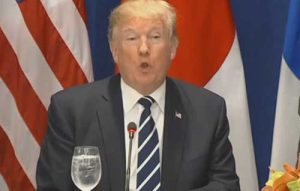
U.S. President Donald Trump imposed new economic sanctions Thursday against North Korea for its nuclear threat, targeting individuals and businesses that finance trade with Pyongyang’s reclusive communist regime and funding for its weapons development.
The U.S. leader called North Korea’s nuclear bomb and ballistic missile programs “a grave threat to peace and security in our world, and it is unacceptable that others financially support this criminal rogue regime. The brutal North Korea regime does not respect its own citizens, or the sovereignty of other nations.”
At the same time, Trump said China’s central bank has ordered a halt to trading with North Korea, although there was no immediate confirmation from Beijing, which long has been Pyongyang’s main trade partner and its economic lifeline. Trump, who long has sought China’s help in reining in North Korean weapons development, praised the Beijing move.
Trump said the new U.S. sanctions give the U.S. Treasury Department authority “to target any individual or entity that conducts significant trade in goods, services, or technology with North Korea.”
He said U.S. officials would “identify new industries, including textiles, fishing, information technology, and manufacturing, that the Treasury Department can target with strong sanctions” and measures to “prevent sanctions evasion.”
Aimed at shipping, trade
Trump said the new U.S. sanctions are aimed at disrupting “critical North Korean shipping and trade networks. For much too long, North Korea has been allowed to abuse the international financial system to facilitate funding for its nuclear weapons and missile programs.”
He said the United States “has had representatives working on this problem for over 25 years, they have done nothing. That’s why we’re in the problem that we’re in today, in addition to, frankly, other countries not doing what they should have done.”
Trump made the announcement alongside South Korean President Moon Jae-in and Japanese Prime Minister Shinzo Abe, both of whom praised the U.S. action as they met in New York on the sidelines of the annual United Nations General Assembly.
Trump imposed the sanctions two days after he mocked North Korean leader Kim Jong Un in a speech at the U.N. as “rocket man” for his missile tests, and said the U.S. would “totally destroy North Korea” if it attacks the United States or its allies.
Pyongyang dismisses Trump’s threats
North Korean Foreign Minister Ri Yong Ho dismissed Trump’s threats, telling reporters in New York late Wednesday that they amounted to “the sound of a dog barking.”
In his speech to Thursday’s U.N. General Assembly session, Moon said, “We do not desire the collapse of North Korea. We will not seek reunification by absorption or artificial means.”[xyz-ihs snippet=”Adsense-responsive”]He added, “If North Korea makes a decisions even now to stand on the right side of history, we are ready to assist North Korea together with the international community. North Korea should acknowledge all these immutable facts as soon as possible.”
South Korea calls for dialogue
Moon called on Pyongyang to immediately cease “making reckless choices” and choose the path of dialogue.
“I urge North Korea to abandon its hostile policies against other countries and give up its nuclear weapons program in a verifiable and irreversible way,” the South Korean leader said.
He called on the international community to “strongly and sternly” respond until North Korea ends its nuclear weapons development.
Trump is sending the top U.S. diplomat, Secretary of State Rex Tillerson, to a Security Council session Thursday to press for enforcement of the U.N. sanctions against Pyongyang aimed at limiting its funds for weapons development.
Previous sanctions
The U.N. has adopted a series of sanctions against North Korea, but so far they have not kept Kim from continuing the weapons tests, including missile launches through the skies over Japan.
U.S. national security adviser H.R. McMaster told CNN that North Korea’s weapons tests are “destabilizing to the world and all nations.”
He said the U.S. wants to resolve the confrontation over North Korea’s nuclear weapons program diplomatically, but that “we have to make sure we’re ready for any eventuality.”
Source: VOA
